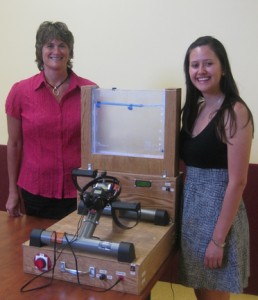Andover Student’s Bubble Bike Encourages Exercise
The article below concerning UMass Lowell student Paula Bustus of Andover and the Bridgewell Day Center first appeared in the Andover Townsman. It is an interesting read.
Local engineer-to-be develops fun tool to help developmentally disabled
UMass Lowell electrical engineering student Paula Bustus of Andover had had no experience with individuals with developmental disabilities last winter when she first visited the Bridgewell Day Center in Lynn. But the University of Massachusetts Lowell student was on a mission, to complete an assistive technology project for one of her requirements.
Her challenge was to create a fitness machine for clients with limited motor skills and short attention spans, according to the school. The goal was to figure out how to motivate them to exercise.
Bustus spent months developing the concept, consulting with Bridgewell staff, assessing client needs and abilities, figuring out the electrical circuits and programming. At the end of the school year, she delivered the final product: a pedaling machine that encourages exercise by creating music and lighting effects in response to the pedaling. The person’s pedaling activates a bubbly display of colored lights and triggers one of five different sets of 10 songs.
“The Bridgewell work with UMass Lowell was a really good learning experience,” said Bustus. “We get to see the application of what we have been learning in the classroom. It’s great to see the end product help someone else.”
“Paula went above and beyond,” said Patty Peterson, an occupational therapist affiliated with Bridgewell. “Paula made it sturdy; she understood that clients need mechanical things that are stable and simple. You can’t have more than one or two switches to operate.”
Started in 1991, the assistive technology program allows faculty, staff and students in the College of Engineering to assist disadvantaged individuals with special needs and problems. It invites problems from community-based partners, according to the school. The National Science Foundation provides some money for materials.
Successful projects are delivered to the client at no cost to the client.
“We need to challenge our students to prove they’re engineers,” said Alan Rux, project technical coordinator of the assistive technology program at UMass Lowell in which Bustus participated. “It’s great. We’re the only program where it’s mandatory for all electrical engineering students.”
“The students we work with have unbelievable talent,” said Peterson. “Many of them have never met anyone with developmental disabilities, so it’s an opportunity for the students as well.”
“This is all about the satisfaction that ‘Wow, I can do this,'” said Senait Haileselassie, who is involved in assistive technology support at UMass Lowell and, like Bustus, had no prior experience with disabled people.
Haileselassie is a 2005 graduate of the electrical engineering program.
“It was an adjustment in the first meeting, but by the second and third meeting you see them differently. You hug them, and you become friends,” she said, adding that the “reward is when you deliver it (your assistive technology project) and see how the clients use it.”

